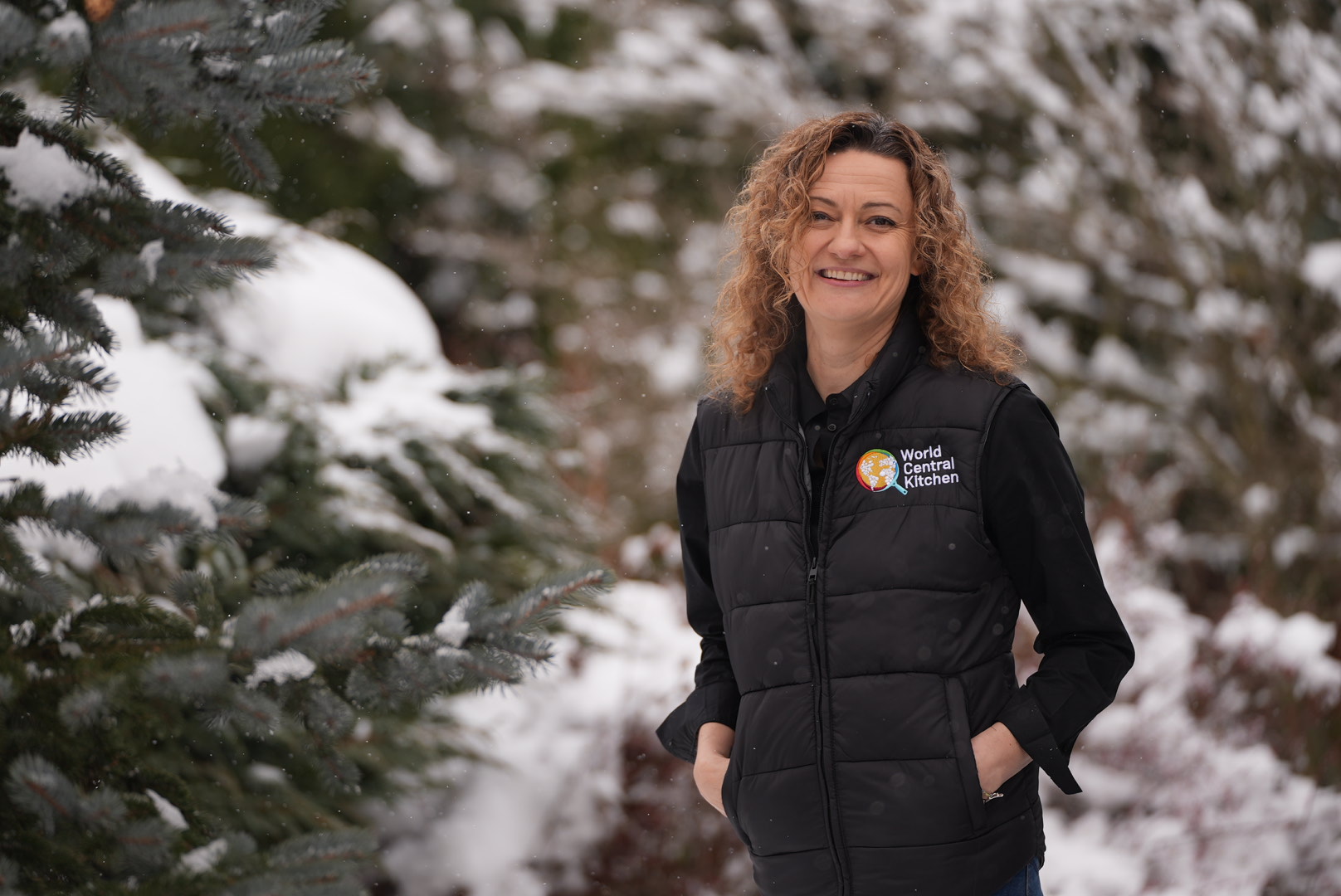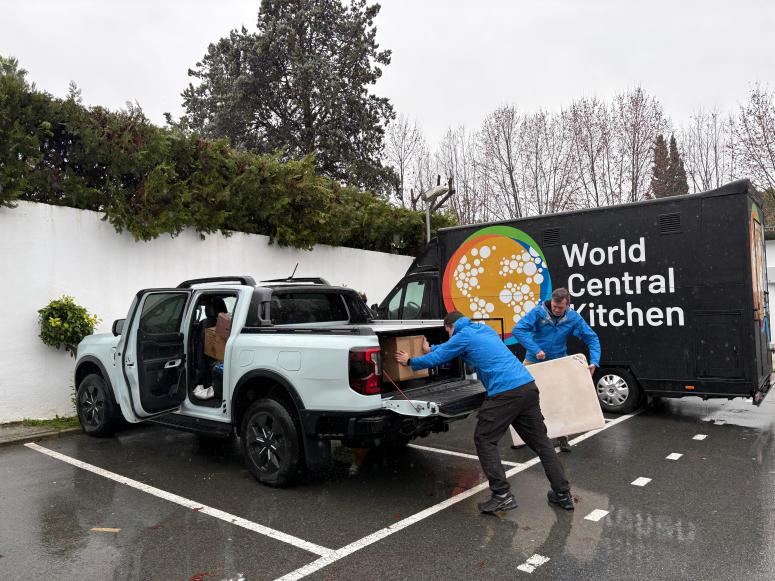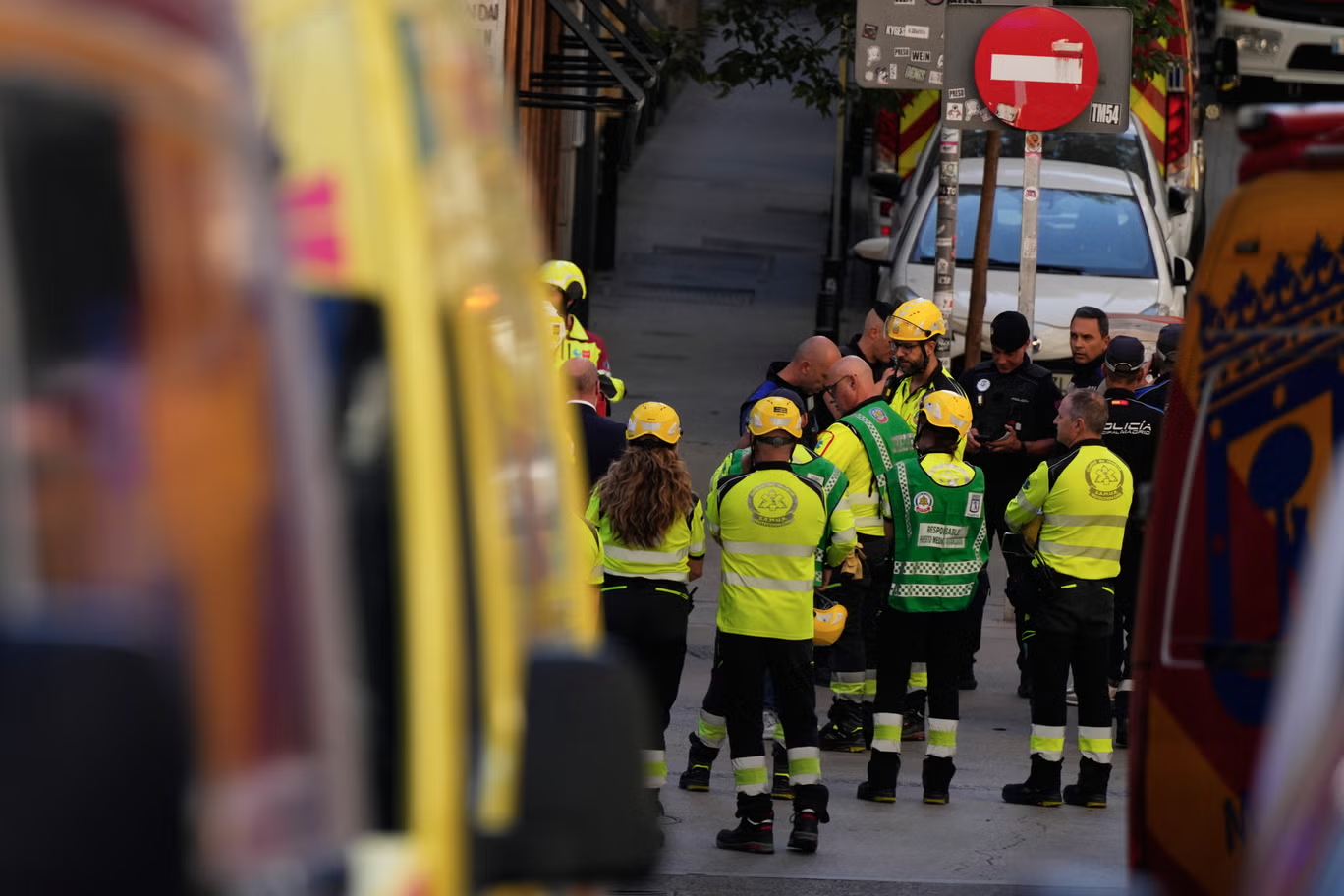Meet Polina: WCK’s Culinary Lead in Ukraine

World Central Kitchen’s Culinary Team is essential to ensuring the highest quality food reaches the communities we support. On the field, this team supervises kitchens, supports restaurant partners, and works collaboratively with our procurement and distribution teams to ensure the food we provide is nourishing and culturally appropriate.
We recently sat down with Polina, WCK’s Culinary Lead in Ukraine, to discuss how her team supports communities in need and what motivates her to show up day after day for Ukrainians living through Russia’s invasion. Originally from the Donbas region, Polina spent more than two decades in North America before returning to her homeland to support people impacted by the war. As part of WCK’s team, she oversees all the culinary functions of our work throughout the country.
Read our conversation below and learn how Polina plays an integral role in ensuring WCK-provided meals reach families in need.
Can you tell us what your role as a Culinary Lead in Ukraine entails?
I oversee the culinary functions of WCK’s work in Ukraine and support our more than 30 culinary partners to help them succeed in serving warm, nourishing meals to our recipients. I also support our Emergency Response Team. My job is to help bring the WCK mission to life, providing comfort and hope to the people of Ukraine through nourishing and culturally appropriate food. That’s the mission and my job is to bring this mission to reality and to help our partners succeed.

My job is to help bring the WCK mission to life, providing comfort and hope to the people of Ukraine through nourishing and culturally appropriate food.
Polina
WCK’s Culinary Lead in Ukraine
What inspired you to get involved in the culinary field?
To start from the beginning, I studied at UC Berkeley to become a human rights attorney. I studied political science, international relations, and law because I was going to save the world from injustice by being a human rights attorney. I quickly realized that there were dynamics at play that required me to take a different path to fulfill my dreams. So, I decided to see what else I was passionate about, and that was cooking. So, 27 years ago instead of finishing law school, I went to a culinary school, and I got a degree from Le Cordon Bleu and became a chef. This has allowed me to help people in a way that makes them happy and in a way that makes me happy.
What brought you to WCK?
When the war began, something inside me moved me to focus on feeding people that had lost access to food. I wanted to help, so I packed my bags and went to Germany [from the US] in hopes of signing up as a volunteer with WCK. I found a slot. I intended to join for a week, but I stayed for three. Then I returned as a contractor in Poland. And once I did this work, I couldn’t go back to feeding people for entertainment. I wanted to use my skills, expertise, and unique knowledge of this particular culture to help people.
Could you tell us about some projects that you’re involved in?
Currently, we are implementing updated meal standards for emergency response in order to address winter temperatures and ensure warm meals reach our recipients. Therefore, we are updating meal requirements for emergency responses, communicating with partners, and ensuring these measures are understood and implemented correctly.
Another ongoing project is food safety training for emergency responses. Food safety risks can emerge due to the fast-paced nature of emergency responses. We have developed guidelines so that our emergency response partners can provide safe meals as quickly as possible to people impacted by Russian attacks. I’ve presented this program to our emergency partners and leads, and now I’m working to ensure they understand it and implement it for future emergency responses.
Outside of that, the bigger project that will last the entire winter involves working with our regular restaurant partners on insulating their delivery boxes and ensuring they maintain the right temperature of the food when it goes into the boxes. Essentially, we’re focusing on temperature control to make sure that meals are warm when people receive them. This will be an ongoing project, and I’m working with all the partners who are all really amazing to work with— receptive and responsive to this initiative.

Can you tell us more about the partners you work with in Ukraine?
Regarding our partners in Ukraine, I am soon going on another trip to visit and guide them individually. Every single partner has their own unique set of circumstances, even within the same region. For instance, Woka, a restaurant in Kramatorsk, has a fully equipped commercial kitchen, while in Sviatohirsk, a partner operates in a kitchen built from an old store using our field kitchen. During my visits, I guide them based on their unique circumstances, working collaboratively to reach our goals.
With every trip, not only do I get to know people more, but also the areas and unique challenges of each partner, which helps me to support them. I developed a better understanding of each region and its unique challenges, realizing it’s impossible to have one blanket solution for everyone. The more I go, the better I understand how I can help them individually.
The more I visit partners, the more amazed I am at how willing they are to help, and listen, and instead of saying “I don’t wanna do this” or “It’s too hard, I’m at war”, it’s always “OK”. They figure it out, and they do it. If they have a question, they contact me. So, I think when I go on these trips, I see the best of humanity because I meet people who are risking their lives, and willing to make the changes that we ask. And I think that’s the overarching theme of every trip.
In what ways do you incorporate cultural and regional preferences into the hot meals we provide?
The very first culinary commitment of the WCK Culinary Standards is that the meals provided to our recipients are culturally appropriate and widely appealing to the communities we support. We research the cuisine of each region we work and work alongside local chefs to help better understand the nuances of each region’s cuisine, seasonings, and cooking techniques. In Ukraine, we work with local restaurant partners to help us create meals that are familiar and heartwarming and which at the same time meet the WCK nutritional requirements. As a Ukrainian-born Culinary Lead of this project, I am able to support and work with our partners as we fine-tune the dishes and the menus of the cuisine that is a part of me, these recipes are ingrained in my soul. It is a very special part of this job for me, to be able to help feed the people of my homeland with the heartwarming dishes of my childhood, which often remind me of my grandma or my mama. The thought that these dishes will bring warmth and nourishment to people who receive them is the greatest gift.
Would you elaborate on the culinary standards you’ve been implementing in Ukraine? What are the key components and requirements for a complete meal, and how do these standards adapt during emergency responses and seasonal changes?
A complete meal from WCK consists of a carb, protein, vegetable, and a side, each with specific weight ranges. This structure applies to regular everyday meals, allowing partners to choose the seasonal side—salad, soup, or fruit—while meeting gram requirements. For hot meals, a typical combination might include a carb like a potato dish, a protein such as a roasted chicken thigh, and vegetables that can be integrated into the meal. During our emergency responses year-round, we also provide nourishing sandwiches, also with specific requirements. The reason is that the sandwich needs to be filling enough to fuel first responders working tirelessly to support people impacted by an attack. We also provide dehydrated food like powdered soups that just require mixing with water to be ready and energy bars. If the response lasts longer, then we provide hot meals, too. In winter time we changed this approach to help people endure the freezing temperatures. To accomplish this, we serve bowls of hearty, hot soup.

Is there any additional information or insights you would like to share?
The most important thing is I’m not doing it alone; it’s a culinary team effort. I work together with Chef Olivier, the Culinary Lead of this project at WCK HQ. He’s in charge, and I came as a new person to WCK, learning how to do things the WCK way but also in a slightly new way because of what makes this response unique. So, I really had to rely on his guidance, and despite being busy with deployments worldwide, Oli manages to meet with me weekly. It’s with his guidance and support, as well as support from all the regional leads who work with me, that I can implement changes with the partners. Courtney, our Ukraine operations lead, has also been very supportive, as has been the rest of the team. So, I get support and guidance from everybody on the team.
Learn more about our #ChefsForUkraine response here. For real-time updates, follow WCK on Twitter, Instagram, and Facebook.




